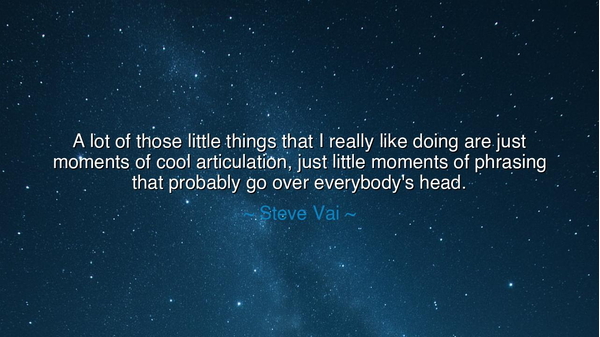
A lot of those little things that I really like doing are just
A lot of those little things that I really like doing are just moments of cool articulation, just little moments of phrasing that probably go over everybody's head.






"A lot of those little things that I really like doing are just moments of cool articulation, just little moments of phrasing that probably go over everybody's head." These words spoken by Steve Vai, one of the most celebrated guitarists of modern times, reflect a deeper understanding of artistry and creativity. In his statement, Vai speaks to the nuances of expression—those subtle, fleeting moments of mastery and skill that only a few truly appreciate. He acknowledges that much of his music, like the finest art, is not meant to be understood in its entirety by every listener, but instead, it is meant to be felt, experienced, and appreciated by those attuned to its finer details. In these "little moments," Vai finds the essence of his craft—where technical brilliance meets creative freedom.
This idea of articulation and the subtlety of creative expression has deep roots in ancient wisdom. The Greeks, particularly philosophers like Plato and Aristotle, understood that the finest forms of expression—whether in art, speech, or music—often lie in the details. Plato believed that true beauty was found not in the grand gestures, but in the small, often overlooked details that revealed the deeper truth of an object or experience. For him, the ideal art was one that captured the essence of the world, not through obvious displays, but through nuanced and refined representations. Similarly, Aristotle spoke of the "golden mean" in all things, the balance between excess and deficiency, which could be found in the smallest moments of harmony—like the delicate phrasing of a musician or the fine brushstrokes of a painter. Vai’s recognition of these subtle moments aligns perfectly with this ancient notion that the most profound expressions lie not in what is most obvious, but in what is hidden in the details.
Throughout history, great artists have always sought to bring depth and richness to their work through these small, deliberate gestures. Take Beethoven, for example, whose symphonies are filled with moments of musical phrasing that may go unnoticed by the casual listener but are crucial to the emotional impact of the piece. The subtle shifts in tempo, the way he manipulates silence between notes, the careful articulation of each phrase—these small moments are what elevate his compositions from simple melody to profound expression. The subtlety of his music, much like Vai’s, speaks to those who are willing to listen closely, to pay attention to the finer details, and who can appreciate the mastery behind what might otherwise be considered a momentary flourish. Beethoven’s work, like Vai’s, is not about the grandiose gestures, but about the hidden details that speak to the soul.
In a similar vein, Steve Vai’s approach to music is often about the mastery of momentary articulation—those fleeting instances of perfect expression that some might miss. Vai’s guitar playing, known for its virtuosity, is filled with intricate licks and phrases that only those with an ear for nuance can truly appreciate. His playing transcends simple technique; it becomes an extension of his creative vision, expressed through every bend of the string and every perfectly placed note. Vai’s acknowledgment that these moments often “go over everybody’s head” is not a lament but a recognition of the unique relationship between artist and audience. It is a gift to those who can perceive it and an invitation to explore the deeper layers of the art.
The lesson here, as Vai teaches us, is not simply about the appreciation of music or artistry, but about recognizing the value of the small moments—the subtle details that make something truly great. Too often, we are swept up in the desire for immediate gratification or surface-level recognition, missing the depth of experience that lies beneath. In life, as in art, it is the little things—the moments of authenticity, the brief exchanges, the fleeting acts of kindness or genius—that define the richness of our existence. Whether in our work, relationships, or personal growth, it is the small acts of clarity and precision that accumulate to create something truly extraordinary.
In our own lives, we should strive to find and appreciate these small moments of articulation—those seemingly insignificant actions that hold the potential to change the course of our day, our relationships, or even our future. Just as Vai crafts music in delicate phrases, we must learn to craft our lives in small, deliberate gestures. Let us not overlook the beauty in the details of everyday life—whether in a conversation, a task, or an act of kindness. In these moments, the true essence of life is often found. As Vai suggests, it’s not always about grand performances but about the subtle expressions that reveal the deepest truths of our existence.
Thus, let us take the wisdom of Steve Vai to heart. Let us approach life not only with ambition for grand achievements but also with a dedication to the small, beautiful moments that define the depth of our experience. In each act of creation, let us strive to articulate our passions, our truths, and our visions, even in the smallest, most seemingly insignificant ways, for it is in these fleeting moments that we may find our greatest expression.






AAdministratorAdministrator
Welcome, honored guests. Please leave a comment, we will respond soon